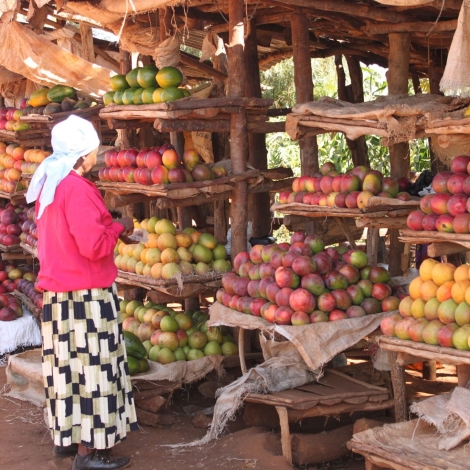A university, a foundation and a global non-profit organization have partnered to research the mango value chain Kenya. Mangos constitute an important, but underserved, niche in the region’s food supply, and their production is low-tech and rich with targets for improvement, experts say.
In the midst of the coronavirus pandemic, research fellows of the global non-profit Engineering for Change (E4C) are working from home desks around the world. Two fellows joined the program through a pipeline of talent established at the University of Missouri in Columbia, Missouri (USA). And the work is supported by experts and resources at Feeding Tomorrow, the foundation of the Institute of Food Technologists (IFT).
This type of investigation may once have been considered impossible to fund and conduct. The difference now is the partnership of three, organizers say.
“Imagine a three-legged stool. For stability, you need a minimum of three legs,” says Dr. Kiruba Krishnaswamy, an assistant professor at the University Missouri who leads the Food Engineering and Sustainable Technologies (FEAST) Lab.
In 2018, Feeding Tomorrow supported E4C’s Research Fellows as they investigated digital solutions to post-harvest food losses in East Africa and technologies in India and Kenya that mitigate aflatoxin, a contaminant of nuts and grains.
See: Technology Trends Of Post Harvest ICT Solutions In East Africa – Powered By IFT
And: Technologies To Mitigate Aflotoxin – Powered By IFT
That same year, Dr. Krishnaswamy was inducted into IFT’s Emerging Leaders Network to join peers who share her passion for the science of food. The opportunity led her to meet Kate Dockins, Vice President and Executive Director of Feeding Tomorrow, who mentioned the foundation’s work with E4C. The collaboration between a global development engineering organization and a food science foundation triggered an idea for a partnership built on research.
“I was excited to see the synergy between both organizations and help to leverage partnership,” Dr. Krishnaswamy says.
Unique talents
Each organization brings distinct areas of expertise to the partnership.
Engineering for Change provides technical know-how with its global community of more than 1 million engineers, academics, global development practitioners and students, as well as the experience of its founding partners, the American Society of Mechanical Engineers (ASME), the Institute of Electrical and Electronics Engineers (IEEE) and Engineers Without Borders – USA.
IFT advances the science of food through its global organization of more than 13,000 individual members spanning 90 countries. Its foundation, Feeding Tomorrow, works to raise awareness of the science of food as a desirable career path.
The University of Missouri (FEAST Lab) provides students in engineering and food science a platform for transdisciplinary collaboration. Students are selected for their interest in global development, academic excellence, and interest in sustainable food processing technologies. Educational institutions such as the University of Missouri can provide young minds opportunities to address the world’s grand challenges, Dr. Krishnaswamy says. As pools of talent, universities can connect public-private organizations.
Partnerships like this may be able to speed progress.
“So many of us are working towards the same mission and partnerships can accelerate impact,” Kate Dockins says. “The collaboration and insights from cross-disciplinary organizations and members are the lifeblood of non for profit, mission-driven organizations. It’s thrilling to see the intersection of innovation and inspiration through this fellowship program.”
A global model
The sentiment reflects a global push for partnerships among entities striving to meet the United Nations’ Sustainable Development Goals, as embodied in SDG 17, “revitalize the global partnership for sustainable development.”
“The fundamental core of good partnerships is their ability to bring together diverse resources in ways that can together achieve more: more impact, greater sustainability, increased value to all,” Darian Stibbe and colleagues at The Partnering Initiative and UN Department of Economic and Social Affairs write in their report, Maximising the Impact of Partnerships for the SDGs. “The SDGs name all societal sectors as key development actors and require an unprecedented level of cooperation and collaboration among civil society, business, government, NGOs, foundations and others for their achievement,” the authors write.
The mango value chain
The model appears to work. Three E4C Research Fellows living in three countries (USA, Ghana, UK) are wrapping up the first phase of a two-part investigation into post-harvest losses on Kenyan mango plantations. Preliminary findings suggest that limitations in harvesting, processing technology and market options may stymie profits and increase losses.
See also: The Adoption of Technology Is Key to Reducing Losses in Mango Value Chains
“So far, our findings show that there is limited availability of technologies for mango processing, especially for post-harvest handling and small-scale processing,” says Bezalel Adainoo, a graduate of the University of Ghana, who lives in Accra, Ghana. Mr. Adainoo was accepted into a Master of Food Science program at the University of Missouri that begins in the fall of 2020. “It is quite surprising that even with the abundance of mangos, there is limited access to markets, which leaves most of the mangos at the local fresh mango markets where a lot goes to waste.”
Behirah Hartranft, an undergraduate student of Biological Engineering at the University of Missouri, has studied large-scale soy operations in the United States, and struggles to avoid comparing them too closely to the Kenyan mango farms she is investigating now, she says.
“Mango farms in Kenya are much smaller and there is almost no equipment involved,” Ms. Hartranft says. Harvesters may even climb trees to pick the fruit rather than using mechanized or even hand tools, and mangos are usually sold whole without any processing to add value or reduce the risk of loss to rot or damage, Ms. Hartranft says.
Only five percent of mangos in Kenya go to processing plants, says Jonathan Kemp, who recently graduated with a Master in Engineering for International Development from University College London (UK). Mr. Kemp now serves as Technical Manager for a Malawian organization called Eagles Relief and Development Programme Intl.
Work in the time of COVID
By necessity of the COVID-19 pandemic, their research is remote. The researchers identified gaps in their knowledge and have developed an interview protocol to speak with a defined set of experts who may be able to supply the missing information by phone and video conference.
E4C is especially suited to support its researchers in a digital environment. Long before the pandemic made remote collaborations a necessity, E4C had demonstrated that online communities can convene groups of people that are unlikely to meet under one roof. The organization launched more than a decade ago as a private website beta-tested by 500 global development engineers living around the world. And since 2014, the E4C Research Fellowship has operated as an online workforce development program, building local engineering capacity in 26 countries to date.
Upon completion, the researchers will publish their findings in E4C’s research archive. Please find more information about published research and E4C’s Research Fellowship at the links below.
Research: www.engineeringforchange.org/research
Research Fellowship: www.engineeringforchange.org/e4c-fellowship

